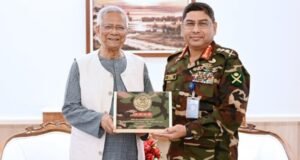
Chief Adviser Professor Muhammad Yunus has urged unified national efforts to protect the fragile ecosystem of St Martin’s Island and to combat the growing threat of plastic pollution.
His remarks came in a statement issued on the occasion of World Environment Day, which Bangladesh will observe on June 25.
He emphasized that it is possible to preserve the nation’s biodiversity and natural heritage through joint efforts for future generations.
Describing the island as an ecologically critical area, he stated that the government has taken steps to limit tourism and create alternative livelihood opportunities for local population. These efforts aim to reduce human pressure on the island’s ecosystem and allow for its restoration and protection.
Marking World Environment Day, traditionally observed globally on June 5, Prof Yunus praised Bangladesh’s participation in this international movement, noting the importance of raising public awareness about environmental issues. This year’s theme, “Ending Plastic Pollution,” set by the United Nations Environment Programme (UNEP), carries particular relevance for Bangladesh, where the use of plastic has seen a significant rise in recent years.
He said the widespread and unregulated use of plastic; particularly single-use plastics, is inflicting serious damage on the environment. Excessive production, careless consumption, and the mismanagement of plastic waste have created a mounting ecological crisis. He stressed that strict control of plastic pollution is now essential to protect both the environment and public health.
Prof Yunus highlighted that the current interim government has initiated several measures to tackle the plastic crisis.
He mentioned that ongoing nationwide monitoring is being carried out to curb the production and use of polythene shopping bags. At the same time, steps are being taken to invent, approve, and introduce eco-friendly alternatives to conventional plastic packaging.
He also said that efforts are underway to reduce cross-border plastic waste and implement projects for the sustainable and environmentally responsible management of plastic waste and marine litter.
In addition, the government is formulating Extended Producer Responsibility (EPR) guidelines under the Solid Waste Management Rules of 2021, requiring producers to collect and manage plastic waste generated by their products.
Prof Yunus noted that Bangladesh, despite being a country of immense natural beauty, is now witnessing serious environmental and ecological threats.
He called on all segments of society to come together to ensure that Bangladesh can move towards a greener, more sustainable future.
 Weekly Bangla Mirror | Bangla Mirror, Bangladeshi news in UK, bangla mirror news
Weekly Bangla Mirror | Bangla Mirror, Bangladeshi news in UK, bangla mirror news







